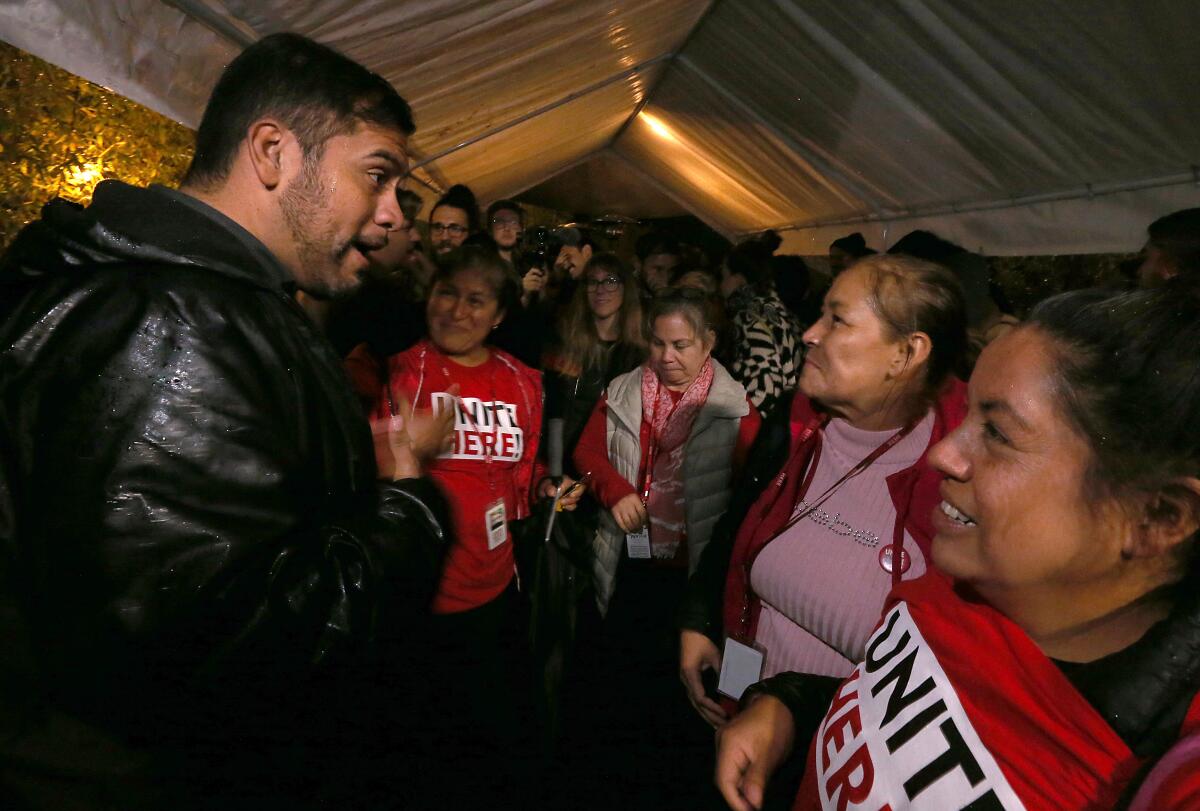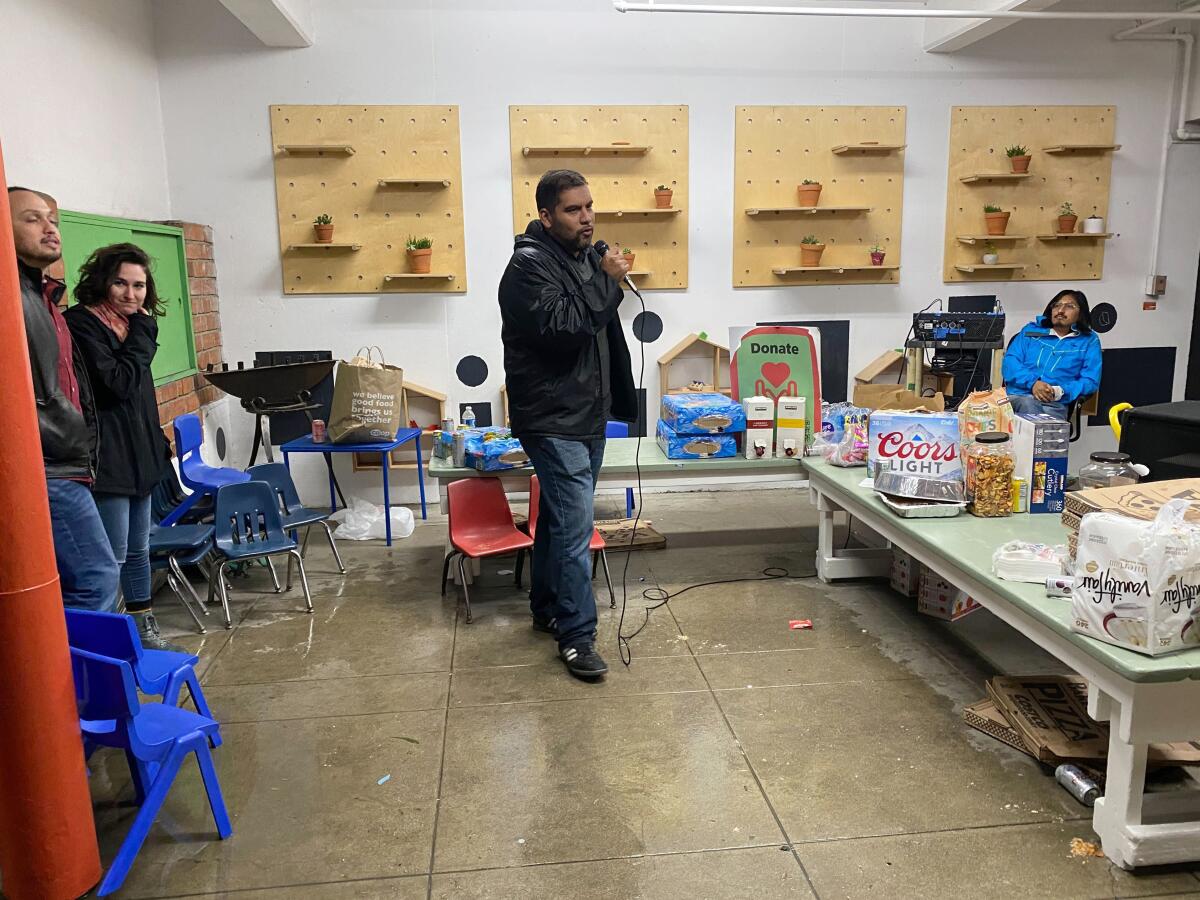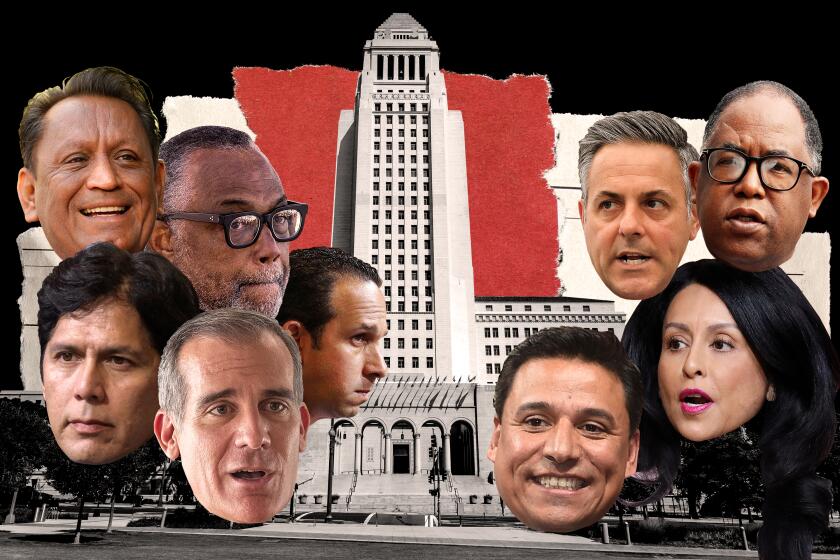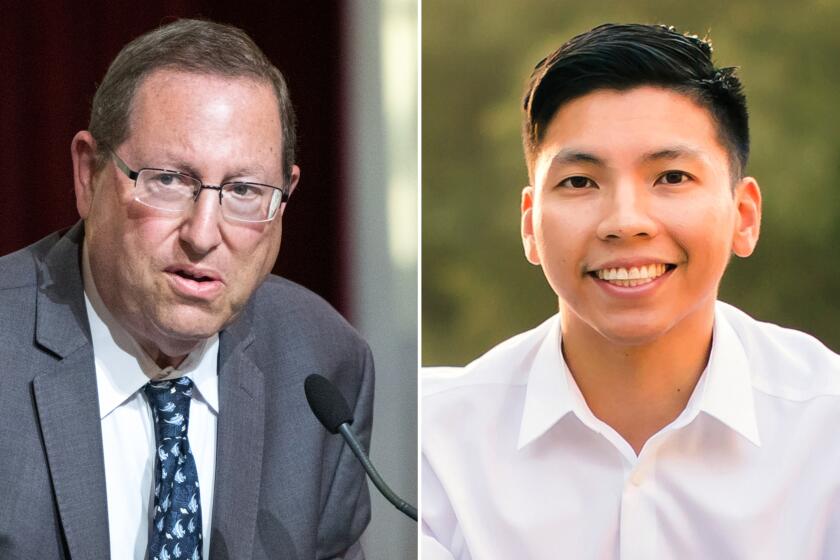How being an L.A. City Council member became political poison in year of scandal, voter rage

If there was one occupation in L.A. that proved to be radioactive with voters this year, it was Los Angeles City Council member.
With corruption scandals, a protracted homelessness crisis and — in the campaign’s final weeks — a secret recording of racist remarks by city leaders, council members found they were repellent to a significant share of the electorate.
Councilmember Joe Buscaino learned that lesson earlier this year, abandoning his bid for mayor a month before the June primary election. Councilmember Kevin de León, another mayoral candidate, landed in a distant third place in that contest. Councilmember Gil Cedillo, a veteran politician, lost his bid for reelection, defeated by an activist who promised to push the city left on public safety and renters’ rights.
Tuesday’s election results — even in their preliminary form — only reinforced that theme. Certified public accountant Kenneth Mejia, a fierce critic of the City Hall establishment, easily vanquished his opponent, Councilmember Paul Koretz, in the race for city controller. In Hollywood, labor organizer Hugo Soto-Martinez emerged Wednesday with a solid lead over Councilmember Mitch O’Farrell, a two-term incumbent criticized over his response to homelessness and rising housing costs.
“I think there’s a real feeling among voters of needing to clean house,” said Loyola Law School professor Jessica Levinson. “And the messiest house right now is City Hall. You cannot escape the corruption issues, the racism issues, and the inaction when it comes to homelessness.”
The numbers could still change in big ways over the coming weeks, as the Los Angeles County registrar-recorder/county clerk counts the late-arriving mail-in ballots. Still, if the results follow the trajectory that played out in the June primary, the remaining ballots could be even more hostile to sitting council members, who earn more than $229,000 per year and represent, on average, about 260,000 people.
Council President Paul Krekorian, who filled the council’s leadership spot after one of his colleagues, former Councilmember Nury Martinez, resigned from office in disgrace, said he is aware of the voters’ frustration.
“At a time when the city is going through great crisis, great division, it’s understandable that the public can get angry at their elected government,” he said while attending O’Farrell’s election night party. “We have a lot of work to do on the City Council to restore confidence.”
Council members, those who were campaigning and those who weren’t, have largely sought to distance themselves from colleagues who had gotten into different forms of trouble. They argued that the city is making substantive progress on homelessness, a point of view that is greeted skeptically by many Angelenos.
Alex Fumero, a volunteer with the Soto-Martinez campaign, was one of those who pushed hard to oust O’Farrell. Fumero, a 39-year-old documentary filmmaker, said that while living in Hollywood, he grew sick watching “luxury developments going up left and right while people were unhoused.”
Voters are pushing the city left, he said, because city leaders have failed to address housing costs, homelessness and other pressing issues.
“People have put their faith in centrist or establishment Democrats in the city for at least a decade now … and they’re not seeing results,” he said.
The winners of four contests for Los Angeles City Council will have the power to shape policy on housing, homelessness, police and other issues.
Ian Manheimer, a volunteer fundraiser for three of this year’s left-of-center candidates — Soto-Martinez, attorney Erin Darling and Councilmember-elect Eunisses Hernandez — struck a similar theme about the City Hall establishment.
“There are extremely powerful people in this city — oil lobbyists, incumbents, political consultants — and they are looking at what we’re doing and they’re scared,” Manheimer told the crowd at Soto-Martinez’s election night party, to an eruption of cheers.
Mejia, the city controller candidate, did not respond to an inquiry from The Times. Jane Nguyen, who managed his campaign, said Mejia’s focus on transparency and accountability resonated with voters who are “fed up with the status quo.”
Koretz, for his part, said he realized early on that running as a council member would be an obstacle. Months before the June primary, Koretz said, his campaign obtained a poll that showed that 55% of respondents would not be inclined to vote for someone with the generic ballot title of council member.
Federal bribery cases targeting two of his colleagues, and the head of the Department of Water and Power, were among the reasons for voter anger, he said.
“People think everyone must be taking a bribe and these are just the ones who were caught,” he said.

Despite those findings, a few of this year’s establishment candidates did prevail. In June, voters reelected council members Bob Blumenfield and Monica Rodriguez in the San Fernando Valley. During that election, Councilmember Curren Price won his reelection in South L.A. with help from an array of labor unions.
The initial results of Tuesday’s election produced some potentially contradictory messages.
Mejia won his race for city controller after spending two years skewering the city over the size of the police budget. On social media, he warned Police Chief Michel Moore that the controller’s office would send a team to every major protest to audit the LAPD’s performance. He also called for the controller’s team to review police officers’ body camera footage.
City attorney candidate Faisal Gill ran on a promise to hold the LAPD accountable, saying he would take a fresh look at misdemeanor filings. Yet he had a much weaker showing than Mejia — and is currently trailing his opponent, attorney Hydee Feldstein Soto.
A similar disconnect could be seen in other preliminary results.
On election night, Soto-Martinez said the city had been “ripped apart” by real estate developers and police unions. Yet on the other side of town, an attorney and former lobbyist for developers and the LAPD’s biggest union — council candidate Tim McOsker — opened up a commanding lead over his opponent, former neighborhood council member Danielle Sandoval.
McOsker ran with the endorsement of Buscaino, a former cop whose mayoral campaign prevented him from seeking reelection. He declined to declare victory, saying he will wait for additional returns.
Tuesday’s council races took place at a time of serious upheaval at City Hall. Since 2020, criminal cases have been filed against three current or former council members, one of whom — Mitchell Englander, who stepped down in 2018 — has pleaded guilty and served prison time.
The Los Angeles political world is no stranger to scandal. In fact, there have been so many it can be hard to keep them straight.
Former Councilmember Jose Huizar is awaiting trial on charges of racketeering, bribery and fraud and has pleaded not guilty. Councilmember Mark Ridley-Thomas, suspended by his colleagues last year, is awaiting trial in an unrelated bribery case stemming from his time on the county Board of Supervisors. He too has pleaded not guilty.
Martinez resigned last month after the release of a secretly recorded conversation in which she made racist and derogatory remarks. Since then, Cedillo and De León have faced furious calls for their resignation.
Lori Dajose, who handles communications for the Democratic Socialists of America’s L.A. chapter, said the leaked audio shows “the status quo isn’t working.” During the last few months, DSA volunteers knocked on more than 10,000 doors for Soto-Martinez in O’Farrell’s district, where more than 800 of their members reside, she said.
The DSA played a major role in electing Councilmember Nithya Raman in 2020 and helped Hernandez win her Eastside seat earlier this year. Raman and Hernandez both ousted incumbents.
“I think that these victories are ramping up, like Nithya and Eunisses and hopefully now Hugo,” Dajose said. “I know the metaphorical wave is very overused, but you feel that people are ready for this kind of change.”
Despite a significant fundraising advantage, Koretz, 67, trailed Mejia, 32, by more than 20 points early Wednesday.
The issues surrounding sitting council members cut in other ways.
In L.A.’s coastal district, attorney Traci Park ran a campaign that was sharply critical of the homelessness policies carried out by Councilmember Mike Bonin. Park assailed Bonin, who is stepping down after nine years, over his opposition to the city’s law prohibiting homeless encampments around schools and day-care centers.
On Wednesday, Park had a lead over her opponent, Darling. She declined to declare victory, saying through a spokesperson that she would wait for additional results.
O’Farrell said he has not given up hope, and is awaiting the batch of results that will be released Friday.
“I think I still have a shot,” he said.
Soto-Martinez offered a more confident message, predicting he would defeat O’Farrell by 58% to 42% — a much bigger spread than he had on election night — once every ballot is counted.
“The margin is only going to increase,” he said, after polishing off a sandwich at Langer’s Delicatessen.
Times staff writers Benjamin Oreskes and Dakota Smith contributed to this report.
More to Read
Sign up for Essential California
The most important California stories and recommendations in your inbox every morning.
You may occasionally receive promotional content from the Los Angeles Times.


















